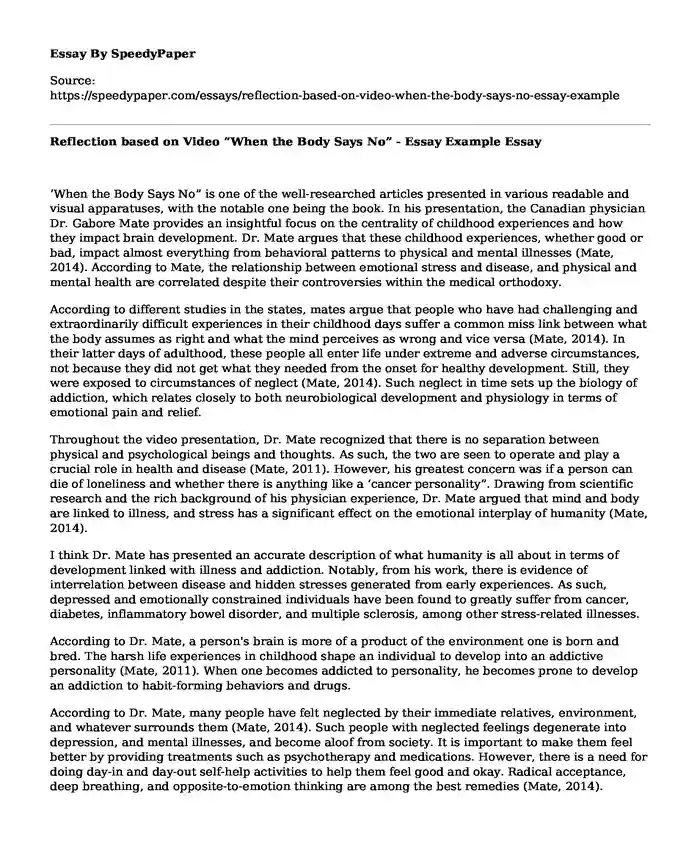
| Type of paper: | Essay |
| Categories: | Psychology Mental health Depression |
| Pages: | 3 |
| Wordcount: | 605 words |
‘When the Body Says No” is one of the well-researched articles presented in various readable and visual apparatuses, with the notable one being the book. In his presentation, the Canadian physician Dr. Gabore Mate provides an insightful focus on the centrality of childhood experiences and how they impact brain development. Dr. Mate argues that these childhood experiences, whether good or bad, impact almost everything from behavioral patterns to physical and mental illnesses (Mate, 2014). According to Mate, the relationship between emotional stress and disease, and physical and mental health are correlated despite their controversies within the medical orthodoxy.
According to different studies in the states, mates argue that people who have had challenging and extraordinarily difficult experiences in their childhood days suffer a common miss link between what the body assumes as right and what the mind perceives as wrong and vice versa (Mate, 2014). In their latter days of adulthood, these people all enter life under extreme and adverse circumstances, not because they did not get what they needed from the onset for healthy development. Still, they were exposed to circumstances of neglect (Mate, 2014). Such neglect in time sets up the biology of addiction, which relates closely to both neurobiological development and physiology in terms of emotional pain and relief.
Throughout the video presentation, Dr. Mate recognized that there is no separation between physical and psychological beings and thoughts. As such, the two are seen to operate and play a crucial role in health and disease (Mate, 2011). However, his greatest concern was if a person can die of loneliness and whether there is anything like a ‘cancer personality”. Drawing from scientific research and the rich background of his physician experience, Dr. Mate argued that mind and body are linked to illness, and stress has a significant effect on the emotional interplay of humanity (Mate, 2014).
I think Dr. Mate has presented an accurate description of what humanity is all about in terms of development linked with illness and addiction. Notably, from his work, there is evidence of interrelation between disease and hidden stresses generated from early experiences. As such, depressed and emotionally constrained individuals have been found to greatly suffer from cancer, diabetes, inflammatory bowel disorder, and multiple sclerosis, among other stress-related illnesses.
According to Dr. Mate, a person's brain is more of a product of the environment one is born and bred. The harsh life experiences in childhood shape an individual to develop into an addictive personality (Mate, 2011). When one becomes addicted to personality, he becomes prone to develop an addiction to habit-forming behaviors and drugs.
According to Dr. Mate, many people have felt neglected by their immediate relatives, environment, and whatever surrounds them (Mate, 2014). Such people with neglected feelings degenerate into depression, and mental illnesses, and become aloof from society. It is important to make them feel better by providing treatments such as psychotherapy and medications. However, there is a need for doing day-in and day-out self-help activities to help them feel good and okay. Radical acceptance, deep breathing, and opposite-to-emotion thinking are among the best remedies (Mate, 2014). Radical acceptance is about complete acceptance of something deep from the soul with your heart and mind that it is the present situation. Deep breathing is acceptable, especially when one is battling ‘own anxiety’ while opposite-to-emotion thinking is acting in the opposite direction from your emotions.
References
Mate, G. (2011). When the body says no: The cost of hidden stress. Vintage Canada. https://www.mentalhealth.org.uk/publications/how-to-mental-health
Mate, G. (2014). When the body says no: Mind/Body Unity and stress-disease connection. [Video File]. https://www.youtube.com/watch?v=qlHIWXWDuF0
Cite this page
Reflection based on Video "When the Body Says No" - Essay Example. (2023, Nov 12). Retrieved from https://speedypaper.net/essays/reflection-based-on-video-when-the-body-says-no-essay-example
Request Removal
If you are the original author of this essay and no longer wish to have it published on the SpeedyPaper website, please click below to request its removal:
- Free Essay: Conclusion of the Oral Delivery of Therapeutic Proteins and Peptides Research
- Ethics and Professionalism Essay Sample
- Paper Example on the Condition of HPV
- Paper Sample: Ovarian and Prostate Cancer
- Free Essay. Electronic Health Records-Business Intelligence
- Risk Perception and Communication Theory - Essay Sample
- Free Essay. Death with Dignity and Green Burial
Popular categories




